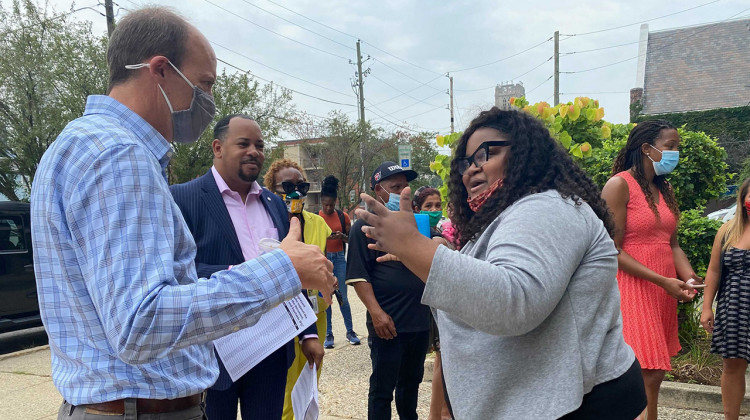
Ashley Thomas, regional organizing director for Stand for Children Indiana, talks to IPS Board of Commisioner members Will Pritchard (left) and Kenneth Allen outside the district office on Thursday, July 29, 2021.
(Elizabeth Gabriel/WFYI)Parents with education advocacy group Stand for Children presented a petition to the Indianapolis Public Schools’ superintendent and board of commissioners on Thursday, outside of the school district building. The document, which had more than 1,200 signatures, symbolizes parents and community members who want IPS to institute more equitable policies.
Ashley Thomas, regional organizing director for Stand for Children Indiana and the mother of two IPS students, said the district has made some strides over the past year as they’ve created a racial equity policy and defined academic goals for students based on racial demographics.
Black and Brown students make up more than 70 percent of the district's enrollment.
“One of our goals in the document that parents drafted were around bold goals,” Thomas said. “Like being specific, disaggregating the data between white, Black and Brown peers. And making sure that they're not just setting an overarching goal that then still keeps Black and Brown students just lumped in one, and you're not really calling out the sore thumb.”
But some of those goals may be difficult to meet. For example, the IPS district announced new board goals last month, which include having 50 percent of Black students in grades 3-8 pass state standardized tests by 2025. But only 3 percent of students in the IPS district passed both the English Language Arts and math tests last year, according to district data released by the state.
Thomas said the goals should be adjusted if needed, but establishing them is the first step.
“Just setting smart goals to make sure that we are reaching and that they're reaching those goals,” Thomas said. “And that they can call out like, ‘Hey, if we're not where we need to be throughout the next five years, then how do we continue to grow? How do we continue to make improvements?’”
The nonprofit Stand For Children is based in Portland, Oregon, and the local chapter started in 2011. In that time, the group has mobilized parents to demand changes at their own schools and financially supported campaigns of select school board candidates.
Recently, the group advocated for more resources to support English language learning families. In response, IPS has also provided language translation headsets during board meetings so Spanish speakers can understand what’s being said.
But parents still want more changes.
Fighting for Language, Racial Justice
Irma Perdomo is a native Spanish speaker and the mother of two IPS students. With the help of a Stand for Children interpreter, she said the language difference can make it hard for her to communicate with school staff about her children.
“For me and parents like me to be engaged we have to do double the work compared to an English speaking parent,” Perdomo said. “Communicating with teachers is challenging. The simple task of calling our child in sick can be a frustrating process. And more importantly, our ability to help and advocate for our children is diminished when we can't understand homework or communicate effectively with teachers and principals.”
Parent advocates said there should be someone in every school who can communicate with non-English speakers, or a service that allows parents to communicate with their school. And parents also need to know which services are available to them.
“ELL families do not know their rights when it comes to education, bullying resources and are afraid they may say something that will negatively affect the everyday education of their students,” Perdomo said. “We need a focus on partners that already have programs that have natural helpers or building parent leaders.”
Thomas said she also wants schools to have more educators of color so students are around more teachers they can relate to. Although Thomas still wants to see more changes, she said she was happy to see IPS Superintendent Aleesia Johnson and most of the seven school board members stand with them at the press conference.
After fighting for school changes for her oldest son over the past seven years, she said she is determined to help other families.
“I told myself I would never sit down again — I have to be the voice for other families," Thomas said. "They don't have to go through having an older child in a situation where the school is struggling and failing, and having parents that don't understand what they can do about it.”
Board Commissioner's Response
School board Commissioner Venita Moore said she thinks the school board is on the same page as the Stand for Children parent advocates.
“I think very much so that the same thing that they're looking for, are the same things that we're striving for,” Moore said. “So we're very much in favor and are in line with the things that they're doing.”
Moore said the district is in the process of implementing an interpretation system that would allow board members to understand non-English speaking parent’s comments. They are also looking at ways to duplicate successful schools.
“Yes, we recognize that our scores weren’t exactly where we would like for them to be,” Moore said. “But we believe in the next four to five years, we will be able to achieve those goals with diligence, with us concentrating on continuing to do those things, and for wrapping our arms around our children and helping them to find the things that they need to be successful.”
Classes for all IPS students start Monday.
Contact WFYI education reporter Elizabeth Gabriel at egabriel@wfyi.org. Follow on Twitter: @_elizabethgabs.
 DONATE
DONATE



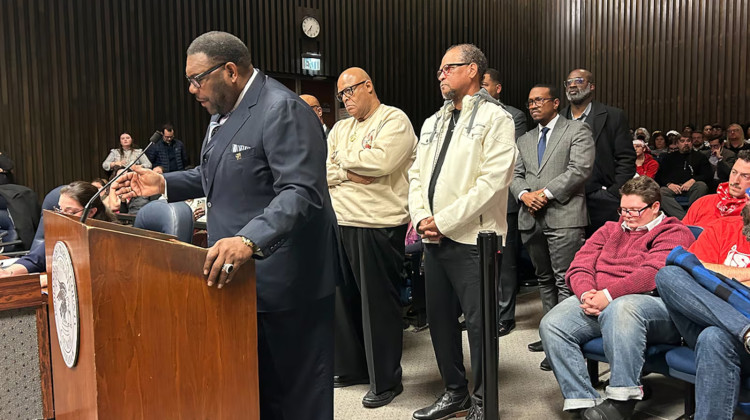
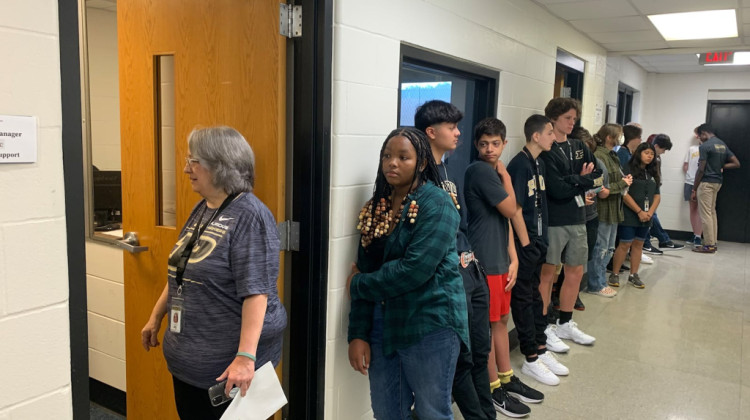
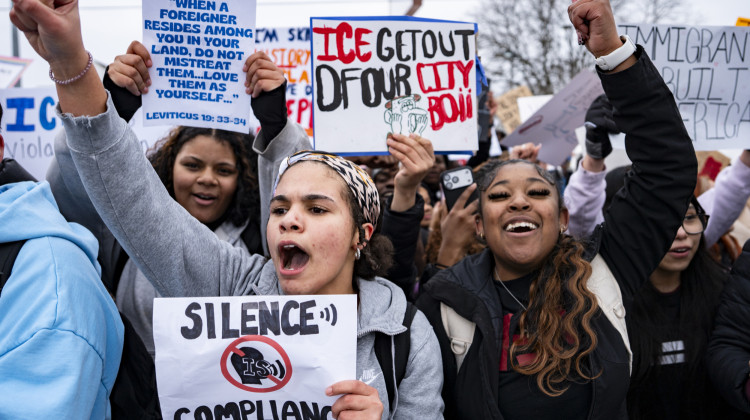
 View More Articles
View More Articles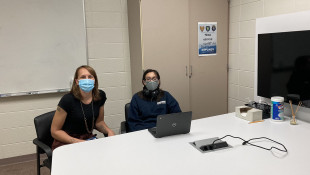
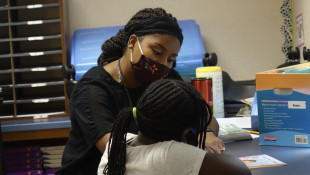


 Support WFYI. We can't do it without you.
Support WFYI. We can't do it without you.